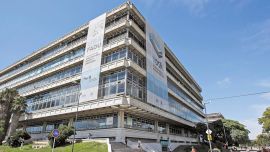Next Saturday Argentina will be beginning its World Cup campaign against Iceland and this is sure to distract many people, though not the New England academic Dr Hale, who writes:
“Numerous literary greats have been born in my home region of New England and some have also died there, including the playwright Eugene O’Neill (who ended his long day’s journey into night at a Boston hotel in 1953). It seems to me that the title of one of his plays The Iceman Cometh will be very much the theme for the Argentine economy in the weeks and months to come. Austerity will descend on Argentina for sure but in what form has yet to be to be defined. Rather than speculate thereon I am more inclined to await that definition in the form of two documents – the final agreement with the International Monetary Fund (IMF) and the 2019 budget (which is also likely to incorporate the former). I understand that the IMF deal is already in the bag but I am not expecting any immediate enlightenment – partly because you’re the last person I’d expect to have any inside information and partly because the Mauricio Macri administration is bound to await a politically propitious moment such as an early World Cup victory in the first round to announce the medicine in full detail. But while I wait, what clues can you give me?”
My reply:
“Whatever austerity lies in store, it would have been doubled if Macri had not vetoed that Senate bill to roll back utility bill increases last week. During the previous presidency I thought that holding down transport fares and utility bills to a few worthless pesos at the price of a subsidy mountain was just another eccentricity of Kirchnerite economic policy but now I’m coming round to the view that it was the central flaw because it hit the balance of payments both ends – energy subsidies alone were 3.25 percent of gross domestic product in the last year of Kirchnerism in 2015 (more or less where the entire fiscal deficit is supposed to be now) while energy imports are a huge part of the trade deficit after losing self-sufficiency in 2010 through removing all incentives for expanding production. Rolling back utility bills now would ha- ve nixed one percent of GDP worth of subsidy savings, a whole year of gradualism – not that gradualism is setting the pace these days – and most likely next year’s target too. By adding over US$5 billion to the deficit, the Senate bill would doubtless have jeopardised up to US$55 billion of low-interest stand-by credit from the IMF – as it is, far from being complicated, the agreement is apparently all but concluded.
“Anyway all that was last week – the austerity requirement may not have doubled but remains to be resolved, a challenge which needs to be faced this month and those to come. All the trickier because the veto incident underlines that it will no longer be easy to muster political consensus in Congress. The devaluation of the last month has caused numerous ravages in the economy (not least the increased cost of servicing the debt which was the price of funding the gradualism of the last two years) but even if it were possible to put the clock back to the summer calm, this would not help – pulling the dollar back below 20 pesos would simply mean continuing to kill exports and pumping more red ink into the trade balance with precious dollars being squandered in the shopping malls of Santiago and Miami.
“Everything indicates that the new equilibrium of interest rates of 40 percent and an exchange rate of 25 pesos meets the satisfaction of the IMF (if not their suggestion) and will be maintained for the next couple of months at least – even if the 25-peso line looks anything but firm at times due to outbursts of Argentina’s peculiar dollar psychosis. A cleaner float would solve the aforementioned problems of the overvalued peso by making exports more competitive and defusing the tourist deficit. But the balance of payments will be improved at the cost of the economy, which will be condemned to a repeat of 2016 stagflation – the combination of devaluation and high interest rates (not to mention a bad harvest) spells growth not much above one percent while inflation is sure to disappoint expectations by finishing above last year’s levels, perhaps uncomfortably close to 30 percent. Both disastrous energy pricing and the in-built dollarisation of the economy predate Macri but this will not protect him from blame. All this will make IMF recommendations even more difficult to sell politically than they are already are.
“Interest rates, the dollar, Central Bank reserves (now dipping below US$50 billion), money supply and other indicators may not be much of an issue with the IMF and neither will a percentage of fiscal deficit reduction which has already been announced by the Macri administration – hence the speed with which the agreement has apparently been concluded. Yet defining and making the cuts will not be easy. When the run on the currency started in late April, Treasury Minister Nicolás Dujovne quickly announced that public works spending would be cut by 30 billion pesos or around 15 percent. More recently, Dujovne has announced further cuts of 20 billion pesos, mostly based on freezing civil service recruitment for the next two years (apart from removing overpaid chauffeurs below ministerial level, the item most favoured by media coverage). But since Macri quickly had to reassure the mostly Peronist provincial governors that the public works cuts would not affect ongoing projects, these cuts are mostly future promises or voluntary retirement. And next year with a presidential election it would take a stern political will indeed to downscale the electioneering of public works. Nor will it be easy to keep a government team frozen either before an election or afterwards (especially if victorious) – just try applying similar restrictions to football trainer Jorge Sampaoli.
“This is not to say that there is not plenty of room for streamlining without eliminating any public service or infrastructural projects – there is also a need to revise priorities which might lead to things like park beautification and community centres ending up on the backburner. But even with optimal policies, there is no immunity from turbulence elsewhere and there will be continued vulnerability – perhaps even during the World Cup hiatus.”



















Comments